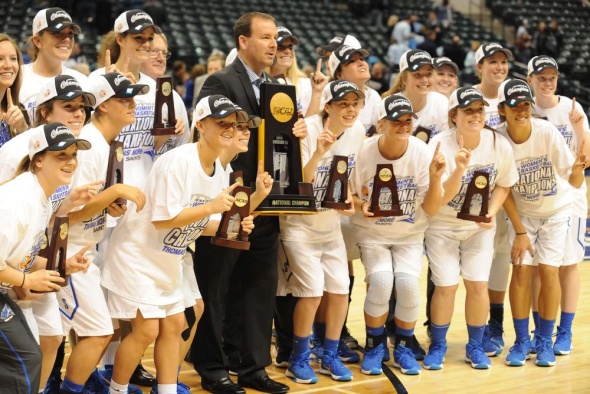DIII Thomas More forced to vacate 2015 national title, NCAA cites improper benefits to Sydney Moss

Thomas More, winners of back-to-back DIII national championships was forced to vacate its 2015 title due to improper benefits to Sydney Moss, the tournament’s MVP for the past two seasons, the NCAA announced Tuesday. Moss graduated last season and transferred to Thomas More after playing the 2012-13 for DI Florida.
What an absolute joke. The NCAA can take what they want but the memories and friendships will last a lifetime! ?? #StillHave2Rings ?
— Sydney Moss (@sydneym40) November 15, 2016
From the NCAA:
Thomas More College failed to monitor its women’s basketball program when it did not identify and report a women’s basketball student-athlete living impermissibly with a former assistant women’s basketball coach, according to a decision issued by the Division III Committee on Infractions. The head women’s basketball coach also failed to fulfill his head coaching responsibilities when he did not monitor the former assistant coach and did not promote an atmosphere for compliance in his program.
Penalties in the case include probation, a vacation of women’s basketball wins in which the student-athlete competed while ineligible, and a self-imposed fine.
For eight months, the former assistant coach provided free housing to a student-athlete while she recovered from surgery. Even though the former assistant coach and his family had an existing relationship with the student-athlete, NCAA rules do not allow college employees to provide cost-free housing to student-athletes.
While the student-athlete was living with the former assistant coach, three staff members learned of the arrangement and assumed it was permissible without checking to see if it would be allowed under NCAA rules. Because the staff members did not recognize the arrangement as an extra benefit, the student-athlete competed an entire season while ineligible.
The head coach failed to monitor his former assistant coach when he was unaware of the living arrangement until the former assistant coach brought it to his attention. He approved of the situation until the athletics director learned of it and decided to end it due to the appearance of a student-athlete living with a coach. The head coach did not promote an atmosphere for compliance when he did not follow department protocol and seek clarification about the living arrangement with the athletics director.
Throughout the entire process, individuals at the college misunderstood NCAA rules and believed the arrangement was permissible. The committee found the misunderstandings stemmed from the college’s failure to provide adequate rules education. Because of the lack of education, staff members were unable to recognize that the arrangement was impermissible and did not consult with others to make sure it followed the rules. Because it did not provide rules education and did not recognize the impermissible living arrangement, the college did not monitor its women’s basketball program.
Penalties and corrective measures include:
- Public reprimand and censure for the college.
- Two years of probation for the college from Nov. 15, 2016, through Nov. 14, 2018.
- A vacation of all wins in which the student-athlete competed while ineligible. The college will identify the games impacted after the release of the public report.
- A $2,500 fine (self-imposed by the college).
- An outside audit of the college’s athletics program, with an emphasis on financial aid policies and procedures. The school must implement all recommendations made by the reviewer (self-imposed by the college).
- Several staff members, including the head coach, athletics director and compliance officer, must attend at least one NCAA Regional Rules Seminar.
Members of the Division III Committee on Infractions are drawn from NCAA membership and members of the public. The members of the panel who reviewed this case are Amy Hackett, committee chair and director of athletics at the University of Puget Sound; Effel Harper, faculty athletics representative at the University of Mary Hardin-Baylor; Tracey Hathaway, associate director of athletics for compliance and student-athlete welfare at the University of Massachusetts Boston; Gerald Houlihan, attorney in private practice; and Gerald Young, athletics director at Carleton College.

